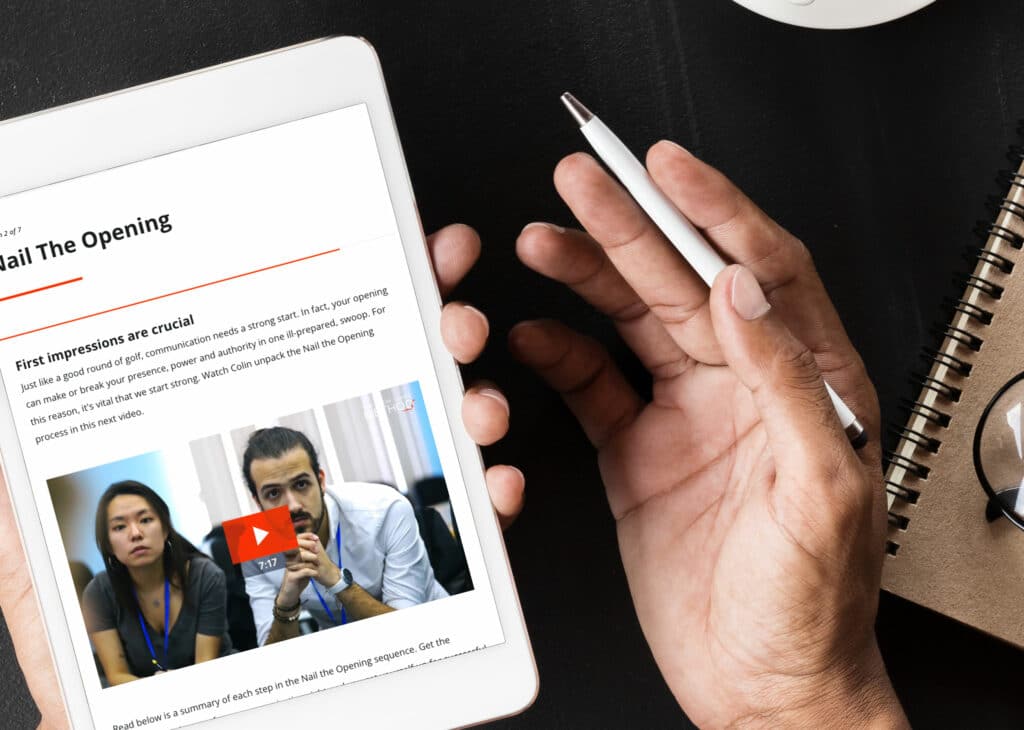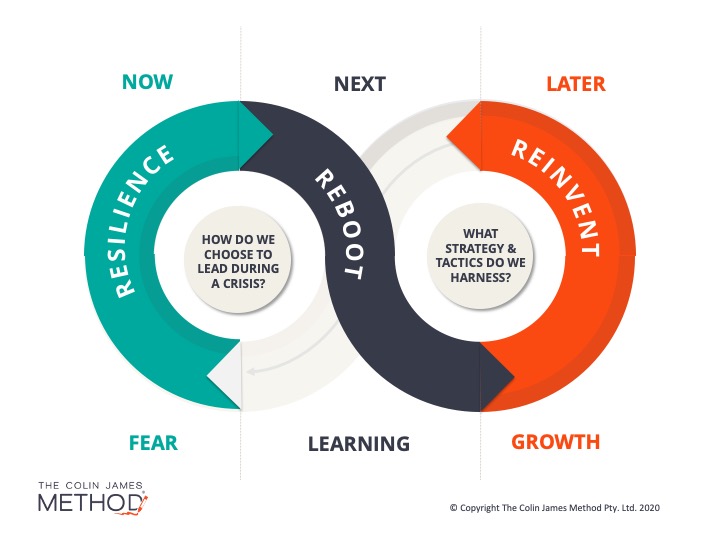There’s no mistake, these are extraordinary times. A third of the global population has been in coronavirus lockdown, and while Australia is moving well along the roadmap to recovery, the future is very unlikely to be the same as before COVID-19 struck.
Businesses all over the world have been implementing their crisis management plans to survive the immediate impact of COVID-19 and lockdown. But there’s more change to come as organisations transition into operating in the post-Coronavirus world.
Here at The Colin James Method®, we’ve combined our experience in change management, business leadership and cultural evolution to develop a three-phase transformation model, which can be used in crisis management situations or to support ongoing change initiatives and business transformations. Based on the three phases, leaders need to guide their teams through to survive and thrive in times of change. It’s a useful framework we are using to support and guide our corporate clients during this time.
The 3-phase crisis management and business transformation model
Phase 1: Resilience
Resilience is a word that has been getting a lot of air time lately, particularly in mental health circles. But what does resilience mean from a business and/or team leadership perspective? The core of it is this:
How do we support the physical and psychological safety of our employees and all those in our ecosystem, whilst ensuring we continue to deliver organisational outcomes?
In business change and crisis management, resilience is the team’s ability to weather the storm, to adapt and survive relatively unscathed.
When an organisation is in the Resilience phase, it’s seeking survival. Perhaps this is causing some financial distress. There may be a lack of clear strategy, communication or direction. The workforce may be disengaged. Productivity, morale and customer service is likely to be dropping.
How can business leaders try to build resilience within his or her team? Sticking your head in the sand and waiting for things to “return to normal” is futile. Instead, it’s time to modify and mobilise. Having flexibility in the following areas is a huge factor:
- Working from home arrangements (in recent times, there has been a need for parents to juggle work and home-schooling, for example)
- Reporting lines, role responsibilities and authority levels (are they still appropriate during and after the transition?)
- Communication and processes (things are different now; the rule-book, in essence, has gone out the window, so a willingness to be adaptable and open to change in these areas is critical – more on this in Phase 2.)
Symptoms your organisation is currently in the Resilience phase –
For teams:
- Feeling overwhelmed
- Low productivity
- Delays of decision making
- Escalation of issues
For businesses:
- Lack of clear strategy
- Financial distress
- Blow out in deadlines (for projects/supply chains etc)
- Poor engagement scores
Phase 2: Reboot
The Reboot phase is all about hope, energy and curiosity as organisations and teams adjust to, or are hungry for, a new way of working. It might be a shift in the market, a technology change, or competitor changes that trigger the Reboot.
In turbulent times of change or crisis, fortitude, focus and fearlessness are required. These all come into play in the Reboot phase because you need a new mode of operations – in the case of the Coronavirus crisis, a virtual one.
Virtual communication is now a necessity, as restrictions on travel and large gatherings are still in place, forcing many business meetings to remain online. For half of you, this reality has probably filled you with dread. You’ve built your business through face-to-face networking and you’re adapting to the digital world with reluctance.
For the other half of you, you’re confident in the digital realm. You may have participated in virtual meetings before. But what was once an irregular occurrence is now the norm and who knows how long your new virtual mode of operations will need to continue? Can your business rely on it to be as effective as in-person interactions? Effective virtual communication requires a whole new set of skills; a great presenter in the boardroom is not necessarily a great presenter on-screen.
Symptoms your organisation is currently in the Reboot phase –
For teams:
- Re-engagement with roles
- Identifying opportunities
- More energy
- Culture shifts
For the business
- Technological change
- Innovation/opportunity to drive market
- Restructure
- Buying/customer changes
Phase 3: Reinvent
As business leaders, you need to be proactive and innovative in times of change. Right now, we all need more than just initial support with reorganisation and crisis communication. We need to look ahead and be pragmatic about what the future has in store.
You may well need a new business model; if your organisation doesn’t currently have a digital product or service offering, now is probably the time to develop one. You’ll need to reexamine your organisational values and purpose, and ask yourself whether they’re still relevant during and post-transformation. You’ll need to be honest about whether your business strategy and structure is still valid.
These grave questions are fundamental to effective change and crisis management and will formulate how you survive in the ‘new world’. But they’re also pretty confronting, which is why the Reinvent phase can cause a lot of confusion and anxiety within leaders and teams.
It may be that your strategy simply isn’t working. Perhaps the very heart of your organisation – its vision and mission – is no longer relevant. Or maybe your service delivery mechanism has been wiped out. All of a sudden, the business has to do what no business ever really wants to do: reinvent itself.
Symptoms your organisation is currently in the Reinvent phase –
For teams:
- Curiosity levels high
- Overwhelm with decision-making
- Challenging conversations taking place
- Different skillsets required
For businesses:
- Strategy not working
- Delivery mechanism changed
- Profitability wiped out
- Economic disruption
In the case of a crisis like the Coronavirus, this could be a total overhaul that effectively relaunches the business. However, under normal circumstances, this 3-phase model is designed to be an ongoing process that helps organisations to feel comfortable with undergoing constant small change. This is the key to remaining competitive.
Time to reflect…
Knowing what you now know about these 3 phases of change, consider the following questions:
- From which stage of the model does your organisation show the most symptoms currently?
- Do you feel secure that you and your team know what you need to do, to progress to the next stage?
- Do you have the support internally to progress to the next stage successfully?
At The Colin James Method®, we’ve been coaching business leaders through crises and change for many years, supporting business to recover and reinvent post the GFC and more recently the Royal Commission led many of our clients to rethink and restructure. When you reflect on the three questions above with your organisation, is there still work to do?
If you need help with what Now/Next/Later looks like for your organisation, please feel free to contact us for a no-obligation conversation. We’d love to support your organisation to transform and lead the charge.

The Colin James Method® Facilitators train corporate executives to improve their professional communication skills with a proven methodology. Our highly trained Facilitators and Coaches are recognised for their experience in their fields and have worked with many individuals and organisations around the world to master the art of communication.











